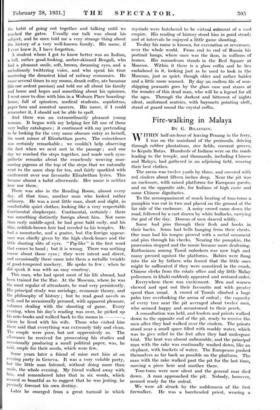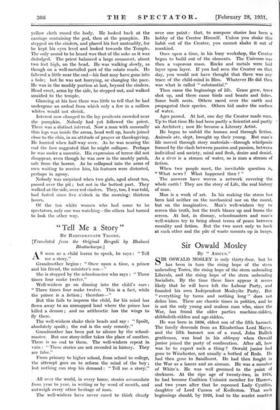Fire-walking in Malaya BY G. BILAINKIN.
WITHIN half-an-hour of leaving Penang in the ferry, I was on the mainland of the peninsula, driving through rubber plantations, rice fields, coconut groves, to Kepala Batas. Hundreds of Indians were on the roads leading to the temple, and thousands, including Chinese and Malays, had gathered in an adjoining field, wearing their best clothes.
The arena was twelve yards by three, and covered with red cinders about fifteen inches deep. Near the pit was an enclosure, with raised platforms for European guests, and on the opposite side, for Indians of high caste and some Chinese dignitaries.
To the accompaniment of much beating of tom-toms a pumpkin was cut in two and placed on the ground at the far side of the enclosure. A noisy crowd came down the road, followed by a car% drawn by white bullocks, carrying the god of the day. Dozens of men danced wildly.
Some had pins through their flesh and hooks in their backs. Some had bells hanging from their chests. One man had his tongue pierced with a metal ornament and pins through his cheeks. Nearing the pumpkin, the procession stopped and the music became more deafening. Enthusiasm among Tamil onlookers was now high and many pressed against the platforms. Babies were flung into the air by fathers who feared that the little ones might be suffocated if they were unnoticed in the crush. Chinese clerks from the estate office and shy little Malay policemen in khaki suddenly appeared and restored order.
Everywhere there was excitement. Men and women chewed and spat out their favourite nut with greater speed than usual. A crowd of Tamils climbed a huge palm tree overlooking the arena of ordeal ; the capacity of every tree near the pit averaged about twelve men, who seemed happy and accustomed to their perch.
A consultation was held, and leaders and priests walked down to the opposite end of the pit, ready to receive the men after they had walked over the cinders. The priests stood near a small space filled with muddy water, which was to give relief to the feet after they had undergone trial. The heat was almost unbearable, and the principal man with the rake was continually washed down, like an elephant, with buckets of water. The Europeans pushed themselves as far back as possible on the platform. The man with the rake walked past the pit for the last time, moving a piece here and another there.
Tom-toms were now silent and the general roar died down. A man approached the pit. Nobody, however, seemed ready for the ordeal.
We were all struck by the suddenness of the first firewalker. • He was a bareheaded priest, wearing a yellow cloth round the body. He looked back at the carriage containing the god, then at the pumpkin. He stepped on the cinders, and placed his feet unsteadily, for he kept his eyes level and looked towards the Temple. The only sound to be heard was that of the coke as it was dislodged. The priest balanced a large ornament, about two feet high, on the head. He was walking slowly, as though on a well-metalled part of the estate roads. He faltered a little near the end—his foot may have gone into a hole; but he was not hurrying, or changing the pace. He was in the muddy portion at last, beyond the cinders. Head erect, arms by the side, he stepped out, and walked unaided to the temple.
Glancing at his face there was little to tell that he had undergone an ordeal from which only a few in a million whites would not shrink.
Interest now changed to the lay penitents crowded near the pumpkin. Nobody had yet followed the priest. There was a distinct interval. Now a man with unusually thin legs was inside the arena, head well up, hands joined close to the chin, in an attitude of prayer or thanksgiving. He hurried when half-way over. As he was nearing the end the face suggested that he might collapse. Perhaps he was under a narcotic. His expression of terror did not disappear, even though he was now in the muddy patch, safe from the horror. As he collapsed into the arms of men waiting to receive him, his features were distorted, perhaps in agony.
Nobody was surprised when two girls, aged about ten, passed over the pit ; but not in the hottest part. They walked at the side, over red cinders. They, too, I was told, had fasted since five o'clock in the morning: thirteen hours.
Of the ten white women who had come to be spectators, only one was watching—the others had turned to look the other way.












































 Previous page
Previous page